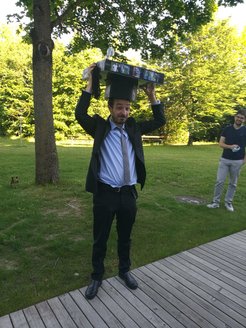Antonio Rubio provides evidence for novel phenomena in thermodynamics and statistical physics
Antonio Rubio successfully defends his PhD thesis and starts a postdoctoral position at ICFo Barcelona. In his thesis, he provides evidence for the existence of two physical phenomena that had been predicted theoretically but not yet tested experimentally. Congratulations!

Antonio’s thesis, entitled “Probing Quantum Thermalisation and Localization in Bose-Hubbard systems,” focused on many-body out-of-equilibrium dynamics. “It’s a fancy way of saying that I looked at how a bunch of atoms that interact with each other evolve after being prepared in an unstable state,” he explains. Antonio was a member of the research group led by Immanuel Bloch. He worked in an ultracold-atom laboratory, often referred to as the "single atoms lab", where rubidium atoms are cooled to extremely cold temperatures and then prepared in an optical lattice. With the help of intense lasers and high-resolution objectives, it is possible to take pictures of their individual positions in this lattice, and extract precise spatial information of their state. The experiments that Antonio Rubio realized during his thesis showed evidence of two novel physical phenomena in the field of thermodynamics and statistical physics. Specifically, they concerned the thermalisation of quantum systems in the presence of two different ingredients: in one case, random disorder, and, in the other, periodic driving. Both experiments had only been predicted theoretically, but not proven experimentally.
“There are probably too many special moments to mention all of them, but I have very good memories of our - prepandemic - group dinners on Friday evening, usually in Garching or in Münchner Freiheit“, Antonio says about his time at MPQ.”
What’s next?
Antonio has taken on a postdoctoral position at ICFO – The Institute of Photonic Sciences, near Barcelona, where he will work on a new setup with strontium atoms. He is excited about this new position since, on the one hand, he will learn a lot about working with a different atomic element and how things are done at a different institution. “At the same time, experiments in our field have been very scarce in my home country until now, which is why it is such a great opportunity to be part of one of them.”












